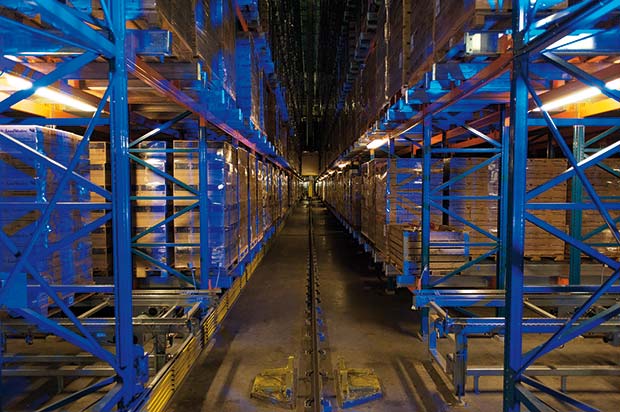In comparison to warehouses in other temperature regimes, cold store warehouses produce the most CO2 per m³ of storage space. However, through a combination of advanced warehouse design, high levels of automation and advanced inventory management, Partner Logistics has dramatically reduced CO2 emissions per pallet stored whilst at the same time enhanced quality and performance levels.

By employing a highly automated end-to-end system coupled with the use of high density pallet racking, Partner Logistics has developed super-sized warehouses with typically five times or more the storage capacity of conventional cold warehouses. As a result, the ‘surface area to volume ratio’ of their warehouses and pallet storage capacity is significantly improved which has led to 50% less energy being used than the European Cold Storage and Logistics Association’s (ECSLA) best standard. At the same time, they use only 50% more energy than facilities one tenth of their size, according to a report by the ECSLA.
In order to operate these large scale CO2 efficient warehouses, Partner Logistics employs advanced automation such as the use of robotic pallet pickers and sophisticated inventory management software which has been developed in-house. This level of automation also delivers Partner Logistics industry-leading quality and performance metrics – for example, their order picking runs at better than 99.8%. Additionally, due to the levels of automation employed, the workforce employed is just a third of that compared to smaller conventional warehouses, helping to keep costs low.
One of the benefits of the automated systems used is the improvement in order accuracy for customers. Product, pallet type, pallet weight and other parameters are all measured as goods arrive and are given a unique barcode identifier to enable end-to-end tracking of every item and pallet. The result is that the final destination always receives the right amount of the right product, and in an excellent condition.
The high level of inventory automation also provides reliable traceability on an individual case level basis and this information is invaluable in recall situations, helping to maintain the highest food safety standards. A further benefit of automation is the possibility to work on a 24/7 basis, which accommodates the 24/7 schemes that retail and foodservice channels increasingly demand.
In order to maximise their potential, Partner Logistics have a complete understanding of their systems and how they can be adapted for use in situations that may arise in the future. To complement this, they promote innovation to their employees which, in turn, leads to a ‘can do’ attitude across the workforce.
Partner Logistics are also currently working on projects which can add value to customers’ processes throughout the supply chain, without being inhibited by the boundaries of conventional storage and distribution.
Partner Logistics




Comments are closed.